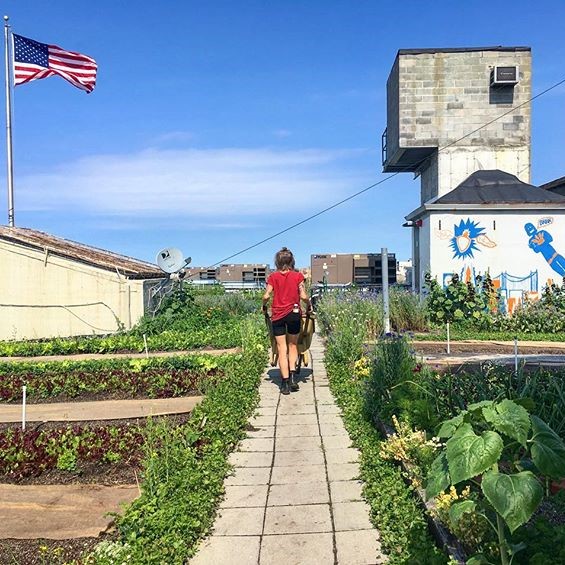
Brooklyn Grange
Brooklyn , NYbrooklyngrangefarm.com
FarmingHoney & Maple
Participating Markets
McGolrick Park 2024 05/05 – 11/10
Brooklyn Grange is the leading rooftop farming and intensive green roofing business in the US. They operate the world's largest rooftop soil farms, located on three roofs in New York City, and grow over 100,000 lbs of organically-cultivated produce per year. The business also operates an apiary, keeping bees in dozens of naturally-managed hives, on roofs, backyards, and nooks dispersed throughout NYC.
In 2010 they planted their first acre, six stories up, on top of a former Standard Motor building in Queens. In talking about it Ben Flanner, Co-founder and CEO, anticipates a key curiosity: "How did we get the soil up here?" he says, "Well, we used a crane and lifted it up, sack by sack. " They had two teams of four people, each person with a very large buggy. They clustered the four buggies together and the crane lifted the "Rooflite certified green roof media" over them. Then they ran each buggy to the furthest end of the roof and unloaded it. The process took six days. To start their second location at the Brooklyn Navy Yard, in 2011, the Department of Environmental Protection awarded Brooklyn Grange a grant, in recognition of the farm's ability to divert storm water from the city's overburdened drainage system. To fill this acre and a half roof, two people guided a rented soil blower truck -- a much easier process.
Today, the three green roofs are estimated to manage a combined 5 million gallons of stormwater per year. They also reduce the urban heat island effect, when black tar rooftops absorb sunlight during the day then emit it at night so that the city never cools down. The farms have become critical habitat for migratory and native pollinators, like birds, insects, and bats, and extend the lifespan of the roof membrane, the replacement of which is a costly process both financially and ecologically.
The healthy rooftop ecosystems are supported with organic farming practices and a focus on what can be done even beyond that to create a net-positive affect on the environment. Ben says, "We're constantly improving our farming practices. This is still a brand-new idea, and we're learning every day." It's paying off in fulfilling their mission to innovate ways "to create future cities that are greener, cleaner, and more delicious."
In 2010 they planted their first acre, six stories up, on top of a former Standard Motor building in Queens. In talking about it Ben Flanner, Co-founder and CEO, anticipates a key curiosity: "How did we get the soil up here?" he says, "Well, we used a crane and lifted it up, sack by sack. " They had two teams of four people, each person with a very large buggy. They clustered the four buggies together and the crane lifted the "Rooflite certified green roof media" over them. Then they ran each buggy to the furthest end of the roof and unloaded it. The process took six days. To start their second location at the Brooklyn Navy Yard, in 2011, the Department of Environmental Protection awarded Brooklyn Grange a grant, in recognition of the farm's ability to divert storm water from the city's overburdened drainage system. To fill this acre and a half roof, two people guided a rented soil blower truck -- a much easier process.
Today, the three green roofs are estimated to manage a combined 5 million gallons of stormwater per year. They also reduce the urban heat island effect, when black tar rooftops absorb sunlight during the day then emit it at night so that the city never cools down. The farms have become critical habitat for migratory and native pollinators, like birds, insects, and bats, and extend the lifespan of the roof membrane, the replacement of which is a costly process both financially and ecologically.
The healthy rooftop ecosystems are supported with organic farming practices and a focus on what can be done even beyond that to create a net-positive affect on the environment. Ben says, "We're constantly improving our farming practices. This is still a brand-new idea, and we're learning every day." It's paying off in fulfilling their mission to innovate ways "to create future cities that are greener, cleaner, and more delicious."



